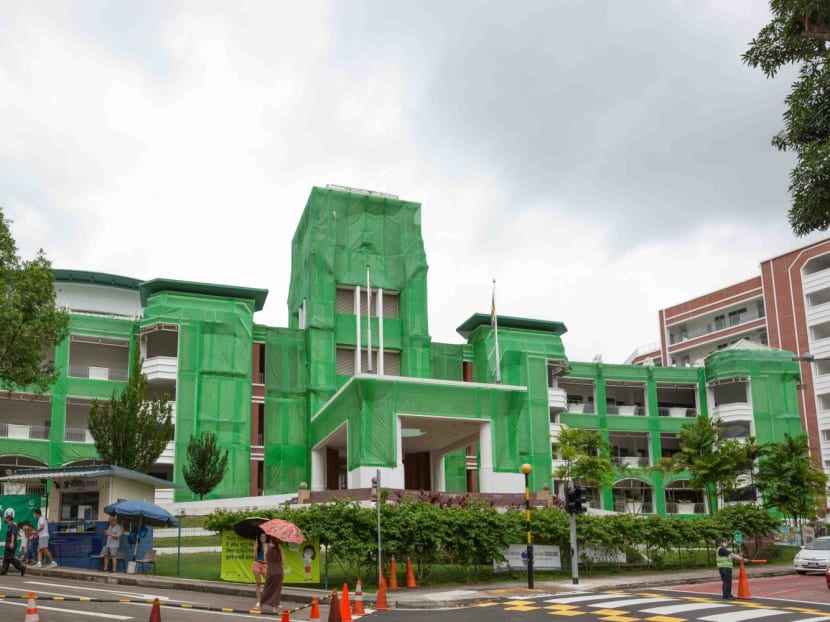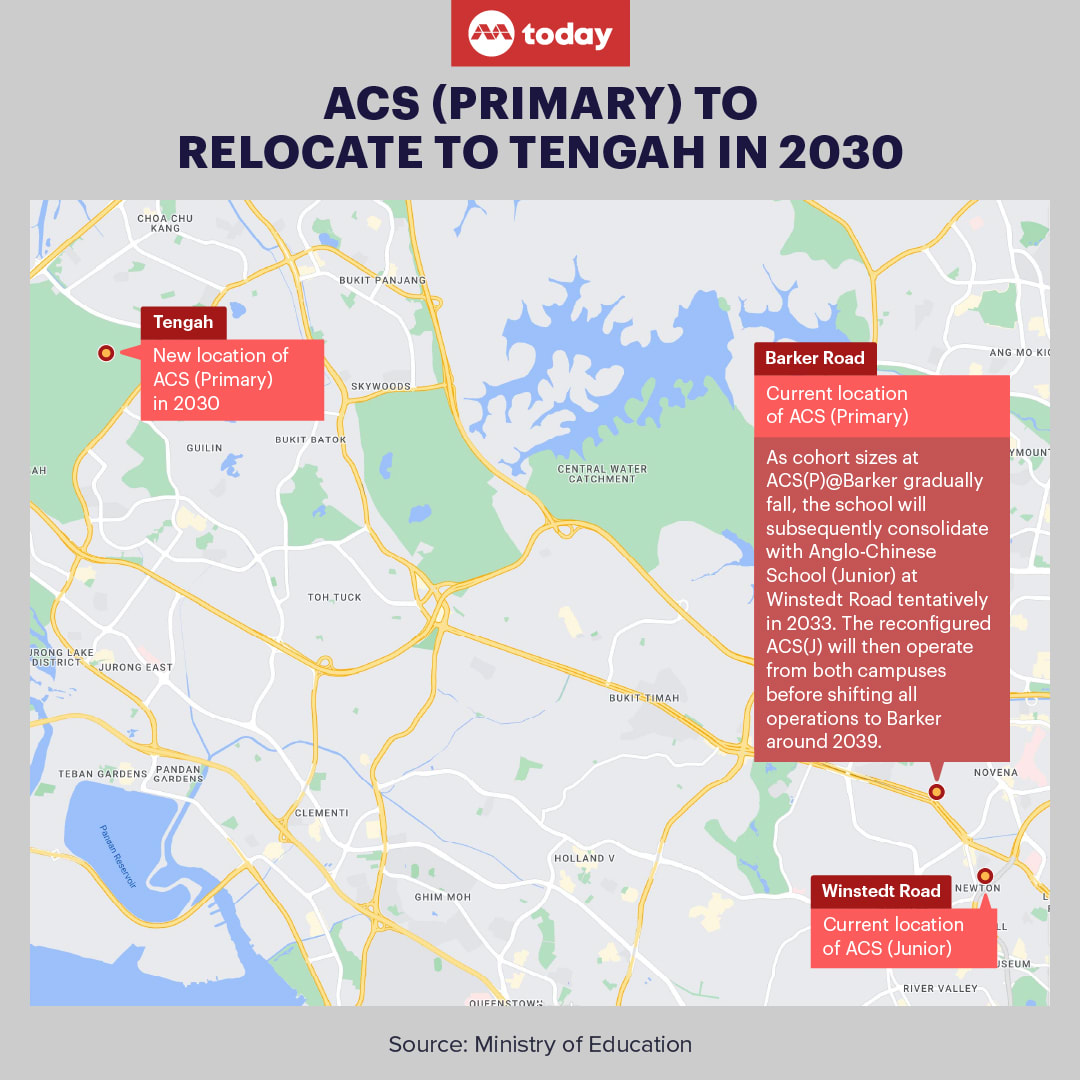ACS (Primary) and alumni’s boards have concerns about ‘faraway’ Tengah, girls joining but some former students welcome move
SINGAPORE — Having spent 10 years at the primary and secondary schools under the Anglo-Chinese School (ACS) banner, Mr Andrew Wilfred, 37, is glad that his young nieces may be able to have the same experience he did, now that ACS (Primary) will be turning co-educational.

Anglo-Chinese School (Primary) on Barker Road undergoing some refurbishing works in a photo taken on Feb 9, 2023.
- Some old students of ACS (Primary) welcome the news of its relocation to Tengah and move to admit girls from 2030
- The president of the ACS Old Boys' Association said that there were concerns among the ACS board of governors, as well as the association’s board about Tengah being far
- They were also concerned about the inclusion of girls in the primary school
- Several former students said that the move will make the school more diverse and inclusive, so they were not concerned about its branding being affected
SINGAPORE — Having spent 10 years at the primary and secondary schools under the Anglo-Chinese School (ACS) banner, Mr Andrew Wilfred, 37, is glad that his young nieces may be able to have the same experience he did, now that ACS (Primary) will be turning co-educational.
Mr Wilfred, who studied at ACS (Primary) on Barker Road in 1999 and works at a think tank, was among several members of the ACS alumni who welcomed the news of its relocation to Tengah new town, as well as its move to admit girls from 2030 as announced on Thursday (Feb 9).
“I had a lot of good memories going to ACS, from the teachers, the friends to the lessons you learn outside the classroom, it's an experience I wish everybody going to school could have.
“And I'm sure it's available at other schools, too, but my experience at ACS defined what a good education should be. It was a nice balance of work and play... admittedly more play for me anyway,” Mr Wilfred said.
“I'm also happy that it is becoming co-ed because I have nieces and would be glad to see them go to ACS if that is possible.”
Barker Road is in the prime Bukit Timah area while Tengah is in the western part of Singapore, near Jurong West and Chua Chu Kang.
Mr Lock Wai Han, president of the ACS Old Boys' Association, said at a press conference on Thursday that there were concerns among the ACS board of governors, as well as the board of the association, about Tengah being "a fairly faraway place".
They were also concerned about the inclusion of girls in the primary school.
Speaking to the media on Thursday afternoon, Mr Lock said: "Once we were able to get more details in and explain the strategic interests of ACS and how we (will) overcome some of these concerns, I think most of them become more assured and were supportive of the move."
He added that the ACS Old Boys' Association sought to explain to alumni that the school would minimise the disruption to existing students due to the relocation.
The number of classes in the new school will also increase and allow daughters of alumni to enrol. This means that alumni "would benefit tremendously" now that both their sons and daughters would be able to get a chance to study there.
Former students interviewed by TODAY said that the move will make the school more diverse and inclusive and they were not at all concerned about the move affecting its branding.
Mr Alvin Tan, Minister of State for Culture, Community and Youth who was an ACS student, said in a Facebook post that the move will make the school “even more inclusive and dynamic”.
“By moving to a developing estate, ACS (Primary) can reach a more diverse population of students. By becoming co-ed, new young families moving to Tengah will get the chance to enrol their sons and daughters to ACS (Primary),” he wrote, adding that the new special education school will also give students the opportunity to make new friends.
Mr Wilfred said that the move to Tengah creates opportunities for inclusivity — efforts to do this can be “pretty tough” when the school is at its current location in the affluent Bukit Timah housing area.
He added that the ACS branding is based on the quality of the education, the experience of the students and ultimately, the achievements of the alumni.
“The location of the school campus is not particularly important as long as the students get all they need to hit their potential.”
A 27-year-old former student who declined to give his name said that one of the defining characteristics of ACS is that it “grooms boys into gentlemen” so the change to co-ed might cause a shift in the school culture.
“But this move is in accordance with our school’s mission, which is to reach out into the heartlands and create an inclusive environment for all. I’m certain that more kids in the community would benefit from this change,” the civil engineer said.
He still hopes his future children would get to study at his alma mater, wherever it may be located.
“Some of my best memories were forged there and I would like the same for my kids.”
Mr Ethan Wong, 25, who studied at ACS (Junior) and later its affiliated secondary school before leaving in 2014, believes that relocating the school and admitting girls into the school would not affect its image, since it creates the opportunity for future students and alumni to benefit from its diversity.
Noting that there are many schools branded under the ACS name that accept pupils from different backgrounds, Mr Wong, who works in media relations, said that the school's move continues its efforts to allow more children to study in affiliation with ACS.
On a personal level, he is not bothered about where a school is located.
“It’s not about the location. What made ACS memorable was its giving culture, the teachers who really cared about their students and the culture built over the years.”
And now, with the primary school opening its doors to female students, Mr Wong said that it would be great if his future children, regardless of gender, can study in the school where he had fond memories. ADDITIONAL REPORTING BY NAVENE ELANGOVAN












